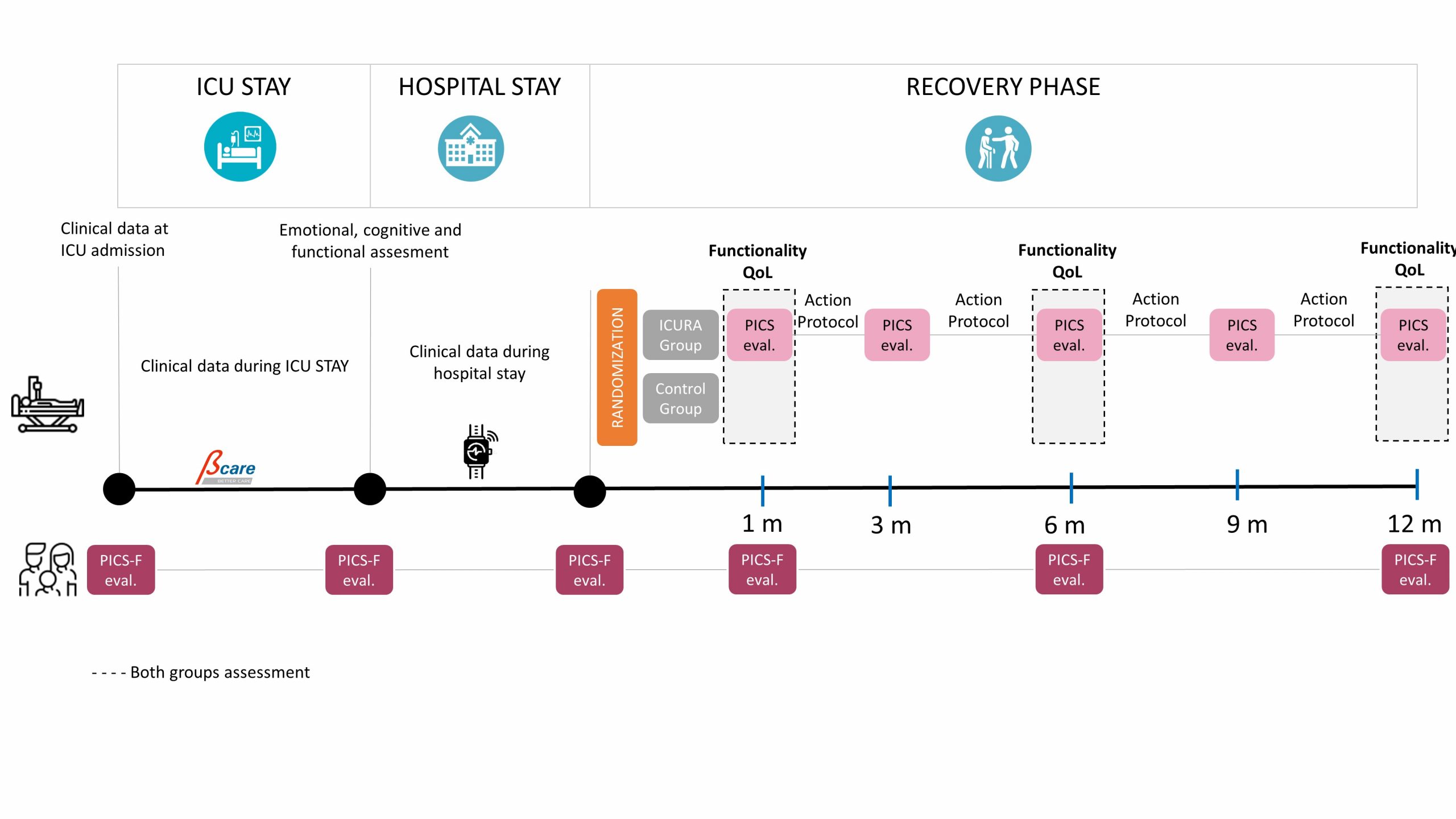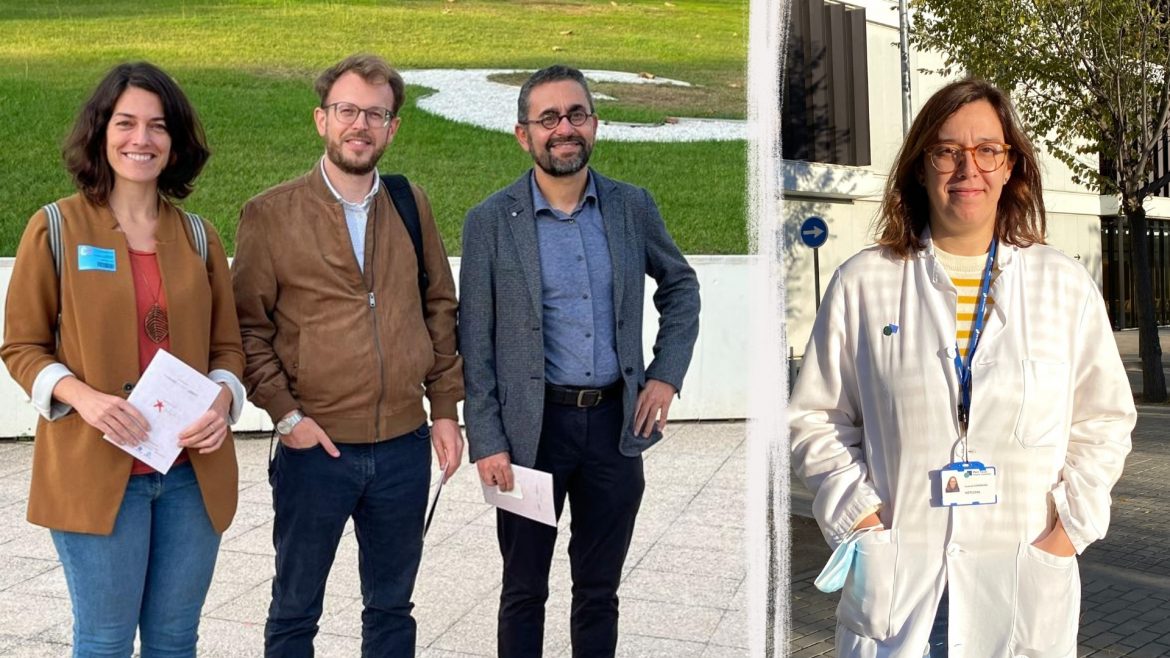ICURA
ICURA
Implementation of a digital tool for telematic monitoring and management of emotional and cognitive sequelae related to Post-Intensive Care Syndrome (PICS): impact on functionality and quality
Welcome to ICURA
The ICURA project addresses the monitoring of critically ill patients once they have left the Intensive Care Unit (UCI), providing digital solutions that make the post-ICU sequelae detection process without increasing the care burden of clinical professionals.
Post-ICU sequelae refer to all the physical, but also cognitive and mental health difficulties that may appear after discharge from the ICU and that are related to the critical illness and its management. In some cases, relatives and carers of patients treated in the ICU may also manifest difficulties in the field of mental health.
For this reason, the ICURA project focuses both on people who have been admitted to the ICU and on their relatives, with the aim of supporting their recovery process and improving their quality of life.
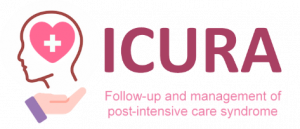
Duration of the project: 3 years
Project type: Multicentric, coordinated by Dra. Sol Fernández, from the translational research group in the critical patient of the I3PT, attached to CIBERES
Economic endowment: €299.771,66
Participating centers
Parc Taulí Health Corporation Consortium (CCSPT)

Parc Taulí Research and Innovation Institute (I3PT)

University of the Balearic Islands
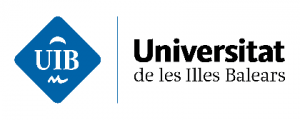
Balearic Islands Health Research Institute
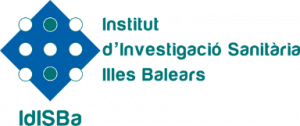
Son Espases University Hospital

hypothesis
Digital health encompasses several useful and scalable technologies for the prevention and monitoring of mental health problems related to the post-intensive care syndrome (SPCI).
main hypothesis
The critical patients participating in the program monitoring and digital accompaniment after discharge from the ICU will show better levels of functionality and quality of life than those participants who carry out the usual follow-up.
These positive effects will also materialize in a better prognosis of emotional and cognitive alterations twelve months after discharge from the ICU.
Secondary hypotheses
The daily collection of physiological, clinical and emotional data during hospitalization and the implantation of w will help us to identify new risk factors for the development ofemotional and cognitive alterations related to the SPCI.
The monitoring of the families and main carers will make it possible to highlight them emotional and cognitive difficulties that can appear in the accompanying persons critically ill patients.
Objectives and methodology
During the COVID-19 pandemic, we have been able to study how the digital health tools are useful and easily applicable to help detect and manage post-ICU health problems. In fact, our research group, through the project PICS-COVID19, developed a digital monitoring platform for the detection of post-intensive care syndrome (SPCI) that has been very well accepted, both by patients with COVID-19 and by clinical professionals.
The aim of the project is to investigate whether the follow-up of people after admission to the ICU with the ICURA platform helps improve patients' mental health, positively impacting their quality of life in the short and long term.
As secondary objectives we want:
- Explore which demographic and clinical factors they are related to the development of emotional and cognitive sequelae after the long-term ICU stay.
- Study what they are emotional and cognitive difficulties of family members of critical patients, both during the acute phase of the disease and during the year following admission.
In this project, we will follow the patients and their relatives from admission to the ICU until one year after discharge, to observe if emotional and cognitive alterations occur.
Randomly, one group of patients will follow up with the ICURA platform, while another group will follow up as usual. This methodology will allow us to see if there are differences in the quality of life between both groups one year after ICU discharge.
Diagram of the study methodology:
Team
The ICURA project is a multicenter study coordinated by the I3PT.
A team of multidisciplinary professionals —made up of psychiatrists, psychologists, intensive care doctors, rehabilitators and physiotherapists, among others— as well as research staff ofParc Taulí Research and Innovation Institute (I3PT) and theParc Taulí University Hospital (Sabadell), and of theBalearic Islands Health Research Institute (IdISBa) i theSon Espases University Hospital (Mallorca) will participate in this study to supervise and accompany ICU patients and their families.
Principal investigators of the project:
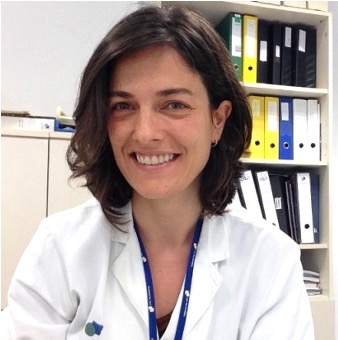
Sun Fernandez Gonzalo

Miquel Roca Bennasar
Impact
Phases and results
- Needs study
- Design of a new data collection system and control panel
- Development and implementation of the new version
- Recruitment of participants during the stay in the ICU
- Follow-up of post-ICU participants
- Evaluation of functionality and quality of life at 3 and 12 months post-ICU
- Database creation
- Realization of statistical analysis
- Interpretation of scientific results
- Presentations in congresses
- Publication of scientific results
- The development of the web
- Citizen visits




